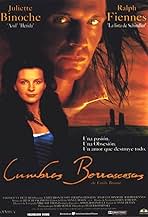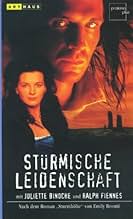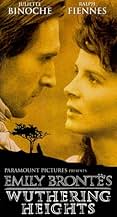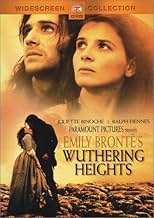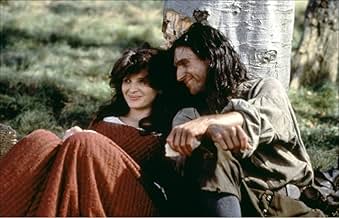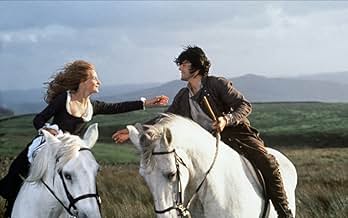AVALIAÇÃO DA IMDb
6,6/10
15 mil
SUA AVALIAÇÃO
Um homem fica obcecado com a vingança quando sua alma gêmea se casa com outro homem.Um homem fica obcecado com a vingança quando sua alma gêmea se casa com outro homem.Um homem fica obcecado com a vingança quando sua alma gêmea se casa com outro homem.
- Direção
- Roteiristas
- Artistas
- Prêmios
- 1 indicação no total
- Direção
- Roteiristas
- Elenco e equipe completos
- Produção, bilheteria e muito mais no IMDbPro
Avaliações em destaque
Wuthering Heights (1992) was directed Peter Kosminsky. It is an excellent film adaptation of the novel by Emily Brontë. Two things make this movie memorable. One is that director Kosminsky chose to give us the full novel, carrying it into the second generation. (Most movies end with Heathcliff and Kathy, but this version continue with the interaction of their children.)
The second memorable aspect of the movie is the wonderful acting of the two leads. Juliette Binoche plays Cathy Earnshaw and Ralph Fiennes portrays Heathcliff. (Binoche also portrays her daughter Catherine Linton.) Fiennes is a brilliant actor, and La Binoche is incomparable. There's an extraordinary onscreen chemistry between them.
I'll make special mention of Janet McTeer, who portrays Ellen Dean, the housemaid who knows everyone's secrets. She does everything a supporting actor should do to enhance the power of the movie.
Wuthering Heights would work better on the large screen, but we saw it on DVD, and it worked well enough. The film has an anemic IMDb rating of 6.9. I think that's because the novel is so dark and grim. The movie itself is much better than the rating would suggest. My recommendation is to see it and decide for yourself.
The second memorable aspect of the movie is the wonderful acting of the two leads. Juliette Binoche plays Cathy Earnshaw and Ralph Fiennes portrays Heathcliff. (Binoche also portrays her daughter Catherine Linton.) Fiennes is a brilliant actor, and La Binoche is incomparable. There's an extraordinary onscreen chemistry between them.
I'll make special mention of Janet McTeer, who portrays Ellen Dean, the housemaid who knows everyone's secrets. She does everything a supporting actor should do to enhance the power of the movie.
Wuthering Heights would work better on the large screen, but we saw it on DVD, and it worked well enough. The film has an anemic IMDb rating of 6.9. I think that's because the novel is so dark and grim. The movie itself is much better than the rating would suggest. My recommendation is to see it and decide for yourself.
SPOILERS Much has been made of this version of Emily Bronte's novel being the first cinematic version to be really faithful to her book. For once, we see the story continue after Cathy's death, and Heathcliff is shown to be truly villainous. More importantly ,this version gets across the fact that BOTH Heathcliff and Cathy are mean, selfish people who destroy themselves, each other and don't seem bothered about destroying others too. Ralph Fiennes is almost Bronte's character on screen, and skillfully maintains a bit of sympathy for Heathcliff even when he is committing the most dreadful of acts. Visually the film, filmed for once in Yorkshire, is terrific- bleak in an almost beautiful way, and a few scenes, such as the hand of Cathy's ghost in the window, are indeed excellently done.
However the film is seriously flawed by it's odd lack of emotion. There is a stiff, 'Merchant Ivory' feel to the film, completely wrong with a story as full of powerful, destructive emotions such as this. Only one scene, when Heathcliff cradles Cathy's body in her grave, really has any real power. Heathcliff's end and reunion with Cathy should be tearjerking, but is hardly moving at all. The attempt to include more of Bronte's plot is not too successful either, because many important scenes are rushed to keep the running time low. And there are some odd changes which do not work. What is the point of having Emily Bronte at the start and at the end, especially when Lockwood still narrates the main story? Why do Heathcliff and Cathy appear to have a sexual relationship, and right near the beginning? Why have Heathcliff beat up his wife? Yes, he mistreated her but having him as a wife batterer makes no sense, is he not bad enough already?
Still a reasonably worthy attempt than, but, in terms of cinema, the 1939 version is far superior.
However the film is seriously flawed by it's odd lack of emotion. There is a stiff, 'Merchant Ivory' feel to the film, completely wrong with a story as full of powerful, destructive emotions such as this. Only one scene, when Heathcliff cradles Cathy's body in her grave, really has any real power. Heathcliff's end and reunion with Cathy should be tearjerking, but is hardly moving at all. The attempt to include more of Bronte's plot is not too successful either, because many important scenes are rushed to keep the running time low. And there are some odd changes which do not work. What is the point of having Emily Bronte at the start and at the end, especially when Lockwood still narrates the main story? Why do Heathcliff and Cathy appear to have a sexual relationship, and right near the beginning? Why have Heathcliff beat up his wife? Yes, he mistreated her but having him as a wife batterer makes no sense, is he not bad enough already?
Still a reasonably worthy attempt than, but, in terms of cinema, the 1939 version is far superior.
As I am a writer, very seldom am I at a loss for words. Yet now, I can find none suitable. I have written many reviews, in many places, for quite a long time. Yet, never, in all of that time have I sat down to write my thoughts immediately after watching a film. Still, I sit here now, trying vainly to describe what I am feeling. What this movie has MADE me feel.
The story of Heathcliff and Cathy is not about love as most know it. It is MORE than love. It is a fusion, a union of two souls separated by society and circumstance, yet bonded so completely that even death could not sever them. Love beyond pain, beyond place, beyond reason.
Never has an adaptation brought this classic Victorian novel so completely to the screen. That, in itself, is high praise. Wuthering Heights had been made 14 times before this, the 1992 incarnation. It is the only version to tell the complete story in all of its dark detail. It is also the LAST time, to date, it has been made. And that should be the highest praise of all.
Why? Because there is no need to do it again. It cannot be improved upon beyond this. Yes, the movie can be a bit confusing, even abrupt in the plot shifts for those who have never read the book. But for those who have: Anne Devlin treats her screenplay with reverence for Emily Bronte's novel. Many whole scenes are intact, the dialog exactly as written originally. The scenery was breathtaking. And the house, the Heights itself, was perfect. Still standing there, after centuries, keeping its own secrets in the silence of its stones.
The cast of actors includes not one single Hollywood darling. Thank God. They would have ruined it. But, because the cast is not overly well known in the US, you concentrate on the PERFORMANCES rather than the performers.
And, it is in these performances this film rises above its predecessors. The actors all turn in solid efforts. Each is true to character, from selfish Cathy (Juliette Binoche) to vapid Isabella (Sophie Ward). Simon Shepherd's Edgar Linton is far more likable than the novel. His portrayal is an improvement on the original, and you actually pity him for being caught between Cathy and Heathcliff.
Heathcliff. An immortal character, like Sherlock Holmes, or Hamlet. Sir Laurence Olivier, arguably the best Hamlet, played Heathcliff in the 1939 version opposite Merle Oberon as Cathy. Until tonight, I thought his was the best Heathcliff, as well. Until tonight.
Tonight I watched Ralph Fiennes play Heathcliff. No, not play. He BECAME Heathcliff. Bronte's Heathcliff. A Heathcliff I had always pictured clearly in my mind, but had NEVER seen before my eyes. Before tonight. This man is RIVETING. He commands the story, seizing it, wrenching it to his will as Heathcliff does the lives of those around him.
Yet, you do not hate him for it. Rather, you ache for him. You look into his eyes and feel every rip in his soul, the agony of every jagged edge in his shattered heart. You watch him wear his cruelty like a mantle, lashing out at a world which denies him the only thing he has ever wanted, the only thing which will make him whole. I cry at movies all the time. Seldom, though, am I torn in a grief so absolute I am left at the end empty, and spent.
I don't know much about Ralph Fiennes work. I tend to like films that deal in anything BUT reality, so have not seen much of him. I loved Red Dragon, but until I read his filmography, I never connected Francis Dolarhyde to Heathcliff, which is perhaps the greatest compliment one can give an actor. Fiennes alone is the reason you cannot improve on this film. No one could ever bring Heathcliff to life like this. The role belongs to him.
I have loved Emily Bronte's novel since childhood. I have read it often. But now, something has changed it for me, forever. No matter how many times I may read Wuthering Heights in future, after tonight, I know I shall never again read it without seeing the face, or hearing the voice, of Ralph Fiennes.
The story of Heathcliff and Cathy is not about love as most know it. It is MORE than love. It is a fusion, a union of two souls separated by society and circumstance, yet bonded so completely that even death could not sever them. Love beyond pain, beyond place, beyond reason.
Never has an adaptation brought this classic Victorian novel so completely to the screen. That, in itself, is high praise. Wuthering Heights had been made 14 times before this, the 1992 incarnation. It is the only version to tell the complete story in all of its dark detail. It is also the LAST time, to date, it has been made. And that should be the highest praise of all.
Why? Because there is no need to do it again. It cannot be improved upon beyond this. Yes, the movie can be a bit confusing, even abrupt in the plot shifts for those who have never read the book. But for those who have: Anne Devlin treats her screenplay with reverence for Emily Bronte's novel. Many whole scenes are intact, the dialog exactly as written originally. The scenery was breathtaking. And the house, the Heights itself, was perfect. Still standing there, after centuries, keeping its own secrets in the silence of its stones.
The cast of actors includes not one single Hollywood darling. Thank God. They would have ruined it. But, because the cast is not overly well known in the US, you concentrate on the PERFORMANCES rather than the performers.
And, it is in these performances this film rises above its predecessors. The actors all turn in solid efforts. Each is true to character, from selfish Cathy (Juliette Binoche) to vapid Isabella (Sophie Ward). Simon Shepherd's Edgar Linton is far more likable than the novel. His portrayal is an improvement on the original, and you actually pity him for being caught between Cathy and Heathcliff.
Heathcliff. An immortal character, like Sherlock Holmes, or Hamlet. Sir Laurence Olivier, arguably the best Hamlet, played Heathcliff in the 1939 version opposite Merle Oberon as Cathy. Until tonight, I thought his was the best Heathcliff, as well. Until tonight.
Tonight I watched Ralph Fiennes play Heathcliff. No, not play. He BECAME Heathcliff. Bronte's Heathcliff. A Heathcliff I had always pictured clearly in my mind, but had NEVER seen before my eyes. Before tonight. This man is RIVETING. He commands the story, seizing it, wrenching it to his will as Heathcliff does the lives of those around him.
Yet, you do not hate him for it. Rather, you ache for him. You look into his eyes and feel every rip in his soul, the agony of every jagged edge in his shattered heart. You watch him wear his cruelty like a mantle, lashing out at a world which denies him the only thing he has ever wanted, the only thing which will make him whole. I cry at movies all the time. Seldom, though, am I torn in a grief so absolute I am left at the end empty, and spent.
I don't know much about Ralph Fiennes work. I tend to like films that deal in anything BUT reality, so have not seen much of him. I loved Red Dragon, but until I read his filmography, I never connected Francis Dolarhyde to Heathcliff, which is perhaps the greatest compliment one can give an actor. Fiennes alone is the reason you cannot improve on this film. No one could ever bring Heathcliff to life like this. The role belongs to him.
I have loved Emily Bronte's novel since childhood. I have read it often. But now, something has changed it for me, forever. No matter how many times I may read Wuthering Heights in future, after tonight, I know I shall never again read it without seeing the face, or hearing the voice, of Ralph Fiennes.
This is an unfairly maligned adaptation. True, if you judge it against more famous adaptations (e.g. the 1939 version), the first half of the film feels inadequate. However if you hold on in there, you'll get the second half of the book, revealing a plethora of themes Emily Bronte was exploring that are non-existent in the other films and revealing the novel's dark cruelty. Why previous adaptors chose to turn the film into a simple love story can be put down to sexism; had it been written by a man, the filmmakers would accept the brutal aspects of the book but of course a Victorian woman could never write such shocking things. For those who only know the story from previous adaptations or the brilliant Kate Bush song, it is a saga of hatred. Being rejected by his childhood love/adopted sister/soulmate Cathy Earnshaw (Juliette Binoche) when she chooses to marry prim Edgar Linton (Simon Shepard). Heathcliff vows vengeance on the Lintons by marrying Edgar's sister Isabella (Sophie Ward) and then also torturing Cathy and Edgar's daughter, Catherine Linton (Juliette Binoche- again!).
The film's mistake is that it is too tentative in the first half. Director Peter Kosminsky still wanted to give viewers the conventional love story that they knew and loved so he made the first half quite gentle in order to mitigate the darker second half. Unfortunately it means that Cathy and Heathcliff's relationship is not tempestuous enough. The famous declarations- "I AM Heathcliff", "I cannot live without my soul"- are spoken quietly and demurely.
Others have mentioned Binoche's excessive giggling, which doesn't convince me that she's seventeen but rather that she's under the influence. The criticisms of her accent is unfair; she has a clear French twang but it's hardly up there in the Hall of Bad Movie Accents. Fiennes' Yorkshire accent is far worse, sounding as if he'd learnt it through watching Postman Pat episodes. His initial niceness is overdone; Heathcliff is a gentle nature-loving soul who we cannot imagine why anyone would be so mean as to beat him as his adoptive brother Hindley (Jeremy Northam) does. Binoche is far too girlish as Cathy, who is essentially a tomboy and whose wild nature makes her identify with Heathcliff.
Things only really get going when Heathcliff returns, allowing Fiennes to drop the awful accent. Kosminsky keeps the novel's framed narrative, with tenant Mr Lockwood arriving at Wuthering Heights and meeting Heathcliff and Cathy II, who he mistakes to be Heathcliff's wife. If you are unfamiliar with the novel, it may be best to locate a family tree as a handy guide. Don't worry though; Emily Bronte meant the family tree to be messy and confusing. That is why I think the double-roling of Binoche as mother and daughter works. It shows how Heathcliff sees Cathy everywhere and adds a perverse sexual tension as well. Binoche is much better as the daughter and Fiennes is stronger as older Heathcliff.
One of the good things about the adaptation is its fidelity to the novel. Using much of the novel's original dialogue, we get a truer picture of Heathcliff's cruelty. It is hard to argue that Heathcliff isn't really that bad when he beats his wife, calls her an 'abject thing' and says she 'degenerates into a mere slut'. Fiennes refreshingly doesn't try to make Heathcliff sympathetic or gloss over his actions; rather he plays a torturer who is tired of tormenting yet unable to stop himself. Heathcliff could have left the second generation alone but instead he punishes them and plays with them like chess pieces.
Whilst I do like the perversely seductive evil of Fiennes' interpretation (his performance here is what got him the role of Amon Goth in Schindler's List), like Olivier he is a little too refined to play early Heathcliff. We can never really buy him as savage; in the book, he is characterised almost like a creature rather than a human. This is why to an extent readers pity him. However Fiennes' Heathcliff is suavely evil.
The inclusion of the second half of the novel is really what recommends this film and why fans of the novel should put it top of their list of adaptations to see. Bronte did not include the main characters' children to be cute or to drag out the story. It gives the story more impact, making the film a saga of one man's bitterness rather than a doomed love story. The film keeps the wonderfully atmospheric ending of the novel and shows through the second generation that the conflict may be resolved and that the things dividing Cathy and Heathcliff will not divide this second generation. Other film adaptations ignore this small ray of optimism and hence the novel is remembered as a big misery fest. First timers to the story may find themselves lost; Wuthering Heights is an odd tale even in the generic film adaptations. The relevance of the second half may not be instantly apparent to them and will certainly be confusing if they come to it with preconceptions of the story. However a re-watch brings new subtleties and nuances that aren't present in the other film adaptations (bar elements of the dreadfully dull 2011 version).
Ironically in order to see the true nature of the story, you have to watch two flawed films (1992 and 2011). One day someone will get it right- hopefully the 1992 film has opened up doors for future films to tackle both generations.
The film's mistake is that it is too tentative in the first half. Director Peter Kosminsky still wanted to give viewers the conventional love story that they knew and loved so he made the first half quite gentle in order to mitigate the darker second half. Unfortunately it means that Cathy and Heathcliff's relationship is not tempestuous enough. The famous declarations- "I AM Heathcliff", "I cannot live without my soul"- are spoken quietly and demurely.
Others have mentioned Binoche's excessive giggling, which doesn't convince me that she's seventeen but rather that she's under the influence. The criticisms of her accent is unfair; she has a clear French twang but it's hardly up there in the Hall of Bad Movie Accents. Fiennes' Yorkshire accent is far worse, sounding as if he'd learnt it through watching Postman Pat episodes. His initial niceness is overdone; Heathcliff is a gentle nature-loving soul who we cannot imagine why anyone would be so mean as to beat him as his adoptive brother Hindley (Jeremy Northam) does. Binoche is far too girlish as Cathy, who is essentially a tomboy and whose wild nature makes her identify with Heathcliff.
Things only really get going when Heathcliff returns, allowing Fiennes to drop the awful accent. Kosminsky keeps the novel's framed narrative, with tenant Mr Lockwood arriving at Wuthering Heights and meeting Heathcliff and Cathy II, who he mistakes to be Heathcliff's wife. If you are unfamiliar with the novel, it may be best to locate a family tree as a handy guide. Don't worry though; Emily Bronte meant the family tree to be messy and confusing. That is why I think the double-roling of Binoche as mother and daughter works. It shows how Heathcliff sees Cathy everywhere and adds a perverse sexual tension as well. Binoche is much better as the daughter and Fiennes is stronger as older Heathcliff.
One of the good things about the adaptation is its fidelity to the novel. Using much of the novel's original dialogue, we get a truer picture of Heathcliff's cruelty. It is hard to argue that Heathcliff isn't really that bad when he beats his wife, calls her an 'abject thing' and says she 'degenerates into a mere slut'. Fiennes refreshingly doesn't try to make Heathcliff sympathetic or gloss over his actions; rather he plays a torturer who is tired of tormenting yet unable to stop himself. Heathcliff could have left the second generation alone but instead he punishes them and plays with them like chess pieces.
Whilst I do like the perversely seductive evil of Fiennes' interpretation (his performance here is what got him the role of Amon Goth in Schindler's List), like Olivier he is a little too refined to play early Heathcliff. We can never really buy him as savage; in the book, he is characterised almost like a creature rather than a human. This is why to an extent readers pity him. However Fiennes' Heathcliff is suavely evil.
The inclusion of the second half of the novel is really what recommends this film and why fans of the novel should put it top of their list of adaptations to see. Bronte did not include the main characters' children to be cute or to drag out the story. It gives the story more impact, making the film a saga of one man's bitterness rather than a doomed love story. The film keeps the wonderfully atmospheric ending of the novel and shows through the second generation that the conflict may be resolved and that the things dividing Cathy and Heathcliff will not divide this second generation. Other film adaptations ignore this small ray of optimism and hence the novel is remembered as a big misery fest. First timers to the story may find themselves lost; Wuthering Heights is an odd tale even in the generic film adaptations. The relevance of the second half may not be instantly apparent to them and will certainly be confusing if they come to it with preconceptions of the story. However a re-watch brings new subtleties and nuances that aren't present in the other film adaptations (bar elements of the dreadfully dull 2011 version).
Ironically in order to see the true nature of the story, you have to watch two flawed films (1992 and 2011). One day someone will get it right- hopefully the 1992 film has opened up doors for future films to tackle both generations.
Only recently have I got round to reading the Emily Bronte classic of 1847 and, having finished it, I immediately wanted to view this 1992 British film version. It is a faithful adaptation in terms of both narrative and language but, although it is filmed in North Yorkshire, both Wuthering Heights and Thrushcross Grange are represented as much larger and grander than I had imagined them. One other criticism: the dance scene is not in the novel and is incongruous because the Grange does not do entertaining.
A notable strength of director Peter Kosminsky's work is its casting. The bewitchingly beautiful Juliette Binoche plays both Catherine Earnshaw and her daughter Cathy Linton and one can imagine why a man would go mad for love of such a woman. As the tormented and cruel Heathcliff, Ralph Fiennes is credibly dark.
Another great virtue of this film version is that, unlike many other movie adaptations of this enigmatic novel, it covers the whole story, rather than stopping at the death of Catherine. The novel is a long one covering three decades, so no film can depict all the incidents, but arguably the most pivotal scene is when Catherine declares her intention to marry Edgar Linton while confessing her love for Heathcliff and this scene is there in this movie.
A notable strength of director Peter Kosminsky's work is its casting. The bewitchingly beautiful Juliette Binoche plays both Catherine Earnshaw and her daughter Cathy Linton and one can imagine why a man would go mad for love of such a woman. As the tormented and cruel Heathcliff, Ralph Fiennes is credibly dark.
Another great virtue of this film version is that, unlike many other movie adaptations of this enigmatic novel, it covers the whole story, rather than stopping at the death of Catherine. The novel is a long one covering three decades, so no film can depict all the incidents, but arguably the most pivotal scene is when Catherine declares her intention to marry Edgar Linton while confessing her love for Heathcliff and this scene is there in this movie.
Você sabia?
- CuriosidadesSinéad O'Connor makes an uncredited appearance as Emily Bronte.
- Citações
Heathcliff: I pray one prayer, I repeat it till my tongue stiffens. Catherine Earnshaw, may you not rest as long as I am living! You said I killed you, haunt me, then!... Be with me always, take any form, drive me mad, only do not leave me in this abyss, where I cannot find you!... I cannot live without my life. I cannot live without my soul.
- ConexõesFeatured in MsMojo: Top 10 Movie Couples Who Are Actually Toxic (2019)
Principais escolhas
Faça login para avaliar e ver a lista de recomendações personalizadas
- How long is Wuthering Heights?Fornecido pela Alexa
Detalhes
- Data de lançamento
- Países de origem
- Centrais de atendimento oficiais
- Idioma
- Também conhecido como
- Wuthering Heights
- Locações de filme
- East Riddlesden Hall, Bradford Road, Riddlesden, Keighley, Bradford, West Yorkshire, Inglaterra, Reino Unido(Heathcliff works in the carding shed)
- Empresa de produção
- Consulte mais créditos da empresa na IMDbPro
- Tempo de duração1 hora 45 minutos
- Cor
- Proporção
- 1.85 : 1
Contribua para esta página
Sugerir uma alteração ou adicionar conteúdo ausente


